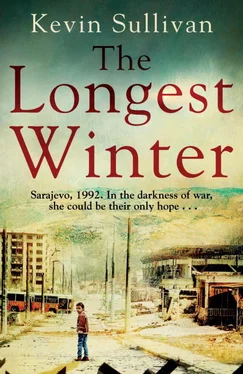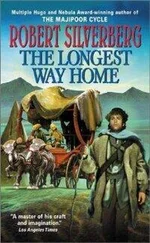‘Mehmed particularly wanted to meet you,’ Jurić explained.
Terry stood up to shake hands.
‘His family is in the east,’ Jurić added. ‘We believe that people outside Bosnia may not understand how difficult the humanitarian situation is there.’
‘I hope you are going to sing for us, Mehmed!’ Zlatko called from the armchair opposite.
Mehmed looked horrified and raised both hands, palms facing outward, and said, ‘I can’t. I can’t.’
‘It’s true,’ Edis remarked. ‘He can’t!’
Sanela went back to sit beside Zlatko and Mehmed sat down beside Terry. Alija began to sing about an ancient love affair.
‘I learned that you would be here,’ Mehmed told Terry in heavily accented English. He nodded towards Jurić, who had gone off to fetch a juice. ‘I work at the hospital.’
He took a document ten or fifteen pages long from the inside pocket of his jacket. Jurić handed him a glass of orange juice.
‘This is information which I would like you to pass on if possible,’ Mehmed said. He gave Terry a shy smile. ‘I know it’s an imposition, but I would be grateful for anything that you or your colleagues in London can do.’
She opened the document.
‘I know,’ Mehmed said quickly. ‘This is very bad.’
There was a picture of a child with a crushed head.
‘It is important we show people what is happening to civilians. I’m sorry if this disturbs you. The reality is more disturbing than photographs.’
The text began with a list of towns – Srebrenica, Žepa, Goražde and others. Beside each town were numbers of people who had died since the beginning of the war from disease, hunger, cold, gunfire, shelling. The numbers were broken down to show the high proportion of dead children.
‘These settlements are cut off,’ Mehmed explained. ‘They can’t be supplied. The Rebels stop aid convoys crossing the lines. Conditions are bad. The statistics speak for themselves. In Žepa we know for sure they are carrying out amputations without anaesthetic. They have no surgical instruments. No antibiotics. Perhaps you could have these documents photocopied; spread them among people you know. Perhaps you know some politicians?’
Terry studied the document. Edis watched Mehmed watching Terry. He felt sorry for Mehmed, whom he knew to be a good man. He had a brother in Srebrenica and he had been part of a group that had gone to plead with the General to do something about the civilians trapped in the eastern enclaves. Now he was giving his painstakingly put-together document to a doctor from London whom Edis was pretty sure couldn’t do much to help. He was sorry that Mehmed was investing so much hope in this encounter with Terry.
Edis began to think about his play, set on a night when the city was sacked by Eugene of Savoy. He had several scenes in which citizens met together fearfully in rooms like this, and they addressed the problem of violence. They addressed the problem of violence even as violence surrounded them and threatened them.
And there was a character like Alija, for whom explanation helped. Understanding why Eugene’s troops were burning the city didn’t compensate for the burning but it made it less frightening. Then there was the Mehmed character. For him there could never be an adequate explanation. His response to the violence was emotional. He represented the indignation of the ages – dead children, burned bodies, raped women, massacred civilians: he was uncomprehending, aghast.
In Edis’ play there was no dialogue between these two. There could not be: their views were incompatible.
Inevitably, there were in the drama two doomed lovers – a Catholic girl taken with her family from the city under the prince’s protection, and the Catholic girl’s Muslim boy.
Edis sighed. Every piece of drama came back to Shakespeare and he’d spent so much time making his play something other than Montagues and Capulets. But it always came back to this. It was in every fibre of his artistic being.
He looked at Zlatko and Sanela sitting across the candlelit coffee table. Some things simply happen, he thought, like snow in winter. It isn’t necessary to turn everything into art. He had no desire to put Zlatko and Sanela in his play. They were real life. They were not doomed.
Edis was thinking this just at the moment when the music stopped and the building shook. They all sat forward.
Jurić had been standing next to the window. The crack of the detonation was close enough to startle him. He jumped forward and spilled some of his whisky.
The room went quiet.
Then the silence was shattered by a second explosion and a third.
‘The hall,’ Jurić ordered.
They moved quickly to the hall, where there was just enough room for everyone to sit on the floor. It was cold. Jurić hurried back into the sitting room and brought blankets from a cupboard. He was stepping back into the hall when there was an explosion that was close enough to send shrapnel and small bits of masonry through the tarpaulin windows of the kitchen.
Terry felt an arm on her shoulder. It was Zlatko. ‘We’re safe here, Doctor,’ he said. ‘Thick Habsburg walls!’ He slapped the plaster behind him and leaned his head against it, and she wondered whether he was being ironic.
Jurić began to hand his guests their winter coats and they struggled into them and then huddled under the blankets. The bombardment continued. Sometimes there was a lull and they would relax and talk about moving back into the sitting room, but then the explosions began again. ‘They’re targeting the presidency,’ Jurić told Terry. ‘It’s in the next block.’
‘Looks like we’re here for the night,’ Zlatko said.
Jurić nodded. ‘It is too dangerous to return to the hotel,’ he told Terry. ‘Zlatko will take you back in the morning to pick up your things.’
The others greeted the prospect of a night on Jurić’s floor without complaint. They had been in this situation many times. The explosions continued for hours, great screaming tremors in the night.
Terry lay awake in the darkness and listened to the shells. From time to time the others joked, whispering in their own language, chuckling softly, tossing and turning and giggling like children.
Terry woke at four. Sanela lay close, her head resting on Zlatko’s arm.
A sliver of moonlight streamed through a crack where the sitting-room door had been left ajar. Jurić was asleep, lying flat on his back beneath the blankets. Alija lay beside him, and closer to the door Mehmed and Edis and Jamila.
They slept in the frail light of a winter moon. Terry closed her eyes. Before she dozed she felt a curious peace, as safe as anyone could feel on such a night, sleeping with heroes.
Milena walked uneasily down the deep gash in the hillside where the road wound serpent-like in the broad space between the apartment blocks. For weeks she had walked to the bar from Alipašino Polje wearing leather boots with thick rubber soles. When she brought them from Foča she had thought them ugly. But that was an ugly day. She chose her things quickly. She wasn’t thinking about style.
In Sarajevo the boots had proved their worth, as Milena trudged back and forth over the snow from Alipašino to the city centre and back again.
But on this night she wasn’t wearing her boots with the thick rubber soles. She wore a pair of close-fitting stylish boots. Her best, in honour of Nina’s appearance at the song contest. It was her custom to change into these boots when she got to the bar, but she hadn’t wanted to wear the ugly outdoor boots when she took Nina to the concert. She thought they made her look like a peasant from the countryside, and she didn’t want to embarrass Nina.
Читать дальше












